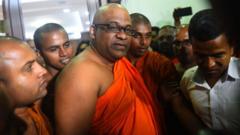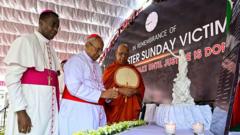Controversial Buddhist leader Galagodaatte Gnanasara has received a nine-month prison sentence for his inflammatory comments aimed at Islam, highlighting the rare accountability for Buddhist monks in Sri Lanka.
Buddhist Monk Sentenced Over Anti-Islam Remarks in Sri Lanka

Buddhist Monk Sentenced Over Anti-Islam Remarks in Sri Lanka
Galagodaatte Gnanasara, a hardline monk, faces justice for inciting religious hatred against Islam.
In a significant ruling, Galagodaatte Gnanasara, known for his extremist views and close ties to former president Gotabaya Rajapaksa, has been sentenced to nine months in prison by the Colombo Magistrate's Court. This conviction stems from derogatory statements made during a 2016 media conference, in which he insulted Islam and stirred up religious tension.
While Sri Lanka typically does not prosecute Buddhist monks, this marks the second time Gnanasara has faced jail time for hate-related offenses. The court emphasized that all citizens, regardless of their religious beliefs, are protected under the Constitution’s guarantee of freedom of belief. In addition to imprisonment, the court imposed a fine of 1,500 Sri Lankan rupees (approximately $5) on Gnanasara. Should he fail to pay the fine, an additional month will be added to his sentence.
Gnanasara's recent legal troubles follow a history of similar accusations and his previous incarceration for contempt of court and intimidation in 2018. Although he was pardoned in 2019 after serving only nine months of a six-year sentence, his recent arrest occurred in December due to ongoing hate speech allegations against Muslims.
This latest development takes place in the context of Sri Lanka's ongoing socio-political struggles, particularly after the exit of former president Rajapaksa, who faced significant public protests due to the nation’s economic turmoil in 2022. During Rajapaksa's tenure, Gnanasara was famously appointed to head a presidential task force promoting religious harmony. However, his track record of anti-Muslim rhetoric has raised concerns and discussions about the implications for communal relations in Sri Lanka.
As tensions continue over religious and ethnic lines, the case against Gnanasara may prove pivotal in shaping the discourse on hate speech and accountability for figures in positions of religious authority. He has filed an appeal against his recent conviction, as legal complexities surrounding his controversial history persist.
While Sri Lanka typically does not prosecute Buddhist monks, this marks the second time Gnanasara has faced jail time for hate-related offenses. The court emphasized that all citizens, regardless of their religious beliefs, are protected under the Constitution’s guarantee of freedom of belief. In addition to imprisonment, the court imposed a fine of 1,500 Sri Lankan rupees (approximately $5) on Gnanasara. Should he fail to pay the fine, an additional month will be added to his sentence.
Gnanasara's recent legal troubles follow a history of similar accusations and his previous incarceration for contempt of court and intimidation in 2018. Although he was pardoned in 2019 after serving only nine months of a six-year sentence, his recent arrest occurred in December due to ongoing hate speech allegations against Muslims.
This latest development takes place in the context of Sri Lanka's ongoing socio-political struggles, particularly after the exit of former president Rajapaksa, who faced significant public protests due to the nation’s economic turmoil in 2022. During Rajapaksa's tenure, Gnanasara was famously appointed to head a presidential task force promoting religious harmony. However, his track record of anti-Muslim rhetoric has raised concerns and discussions about the implications for communal relations in Sri Lanka.
As tensions continue over religious and ethnic lines, the case against Gnanasara may prove pivotal in shaping the discourse on hate speech and accountability for figures in positions of religious authority. He has filed an appeal against his recent conviction, as legal complexities surrounding his controversial history persist.






















